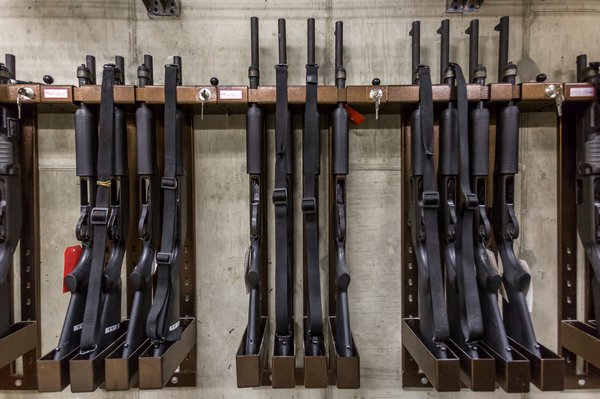This week, the Montgomery County Sheriff's Office announced plans to inspect all 92 gun stores in the county, a first-of-its-kind policy for Pennsylvania that's reduced illegal gun trafficking in other states.
Sheriff Sean Kilkenny said his office would be checking each shop for compliance with state requirements. Under Pennsylvania law, any firearms dealer with a license to sell guns must display that license, keep records of all sales for 20 years, store guns securely when the store is closed and conduct sales only at designated locations.
If a shop is found to be in violation of the law, it could lose its license.
- MORE NEWS
- Gun reform bills passed by Pa. House face a tougher road in GOP-controlled Senate
- Philly voters approve ballot measure to add public safety director to oversee city's gun violence response
- Philly to install more than 100 security cameras to create 'safety net' around city rec centers
Although the Sheriff's Office has always possessed the authority to inspect gun stores, regular checks are uncommon. CeaseFirePA, a gun safety advocacy group that helped craft the inspection plan, characterized the current system for licensing firearms dealers as "a paperwork process" in which sellers "check boxes and indicate their intent to follow the law, then return three years later to renew their permits."
"If food inspectors never stopped at your favorite restaurant, you’re more likely to get food poisoning," said Adam Garber, executive director of CeaseFirePA's Education Fund. "The same is true with licensed firearm dealers – inspections help ensure dealers are keeping up with the due diligence required under the laws designed to keep our communities safe."
On a federal level, inspections are similarly rare. The Bureau of Alcohol, Tobacco, Firearms and Explosives, which oversees gun licensing for all U.S. dealers, visits stores only once every seven years, according to an investigation by The Trace.
But research indicates inspections can reduce illegal gun sales. In a cross-sectional study of 54 U.S. cities, Johns Hopkins researchers found that gun trafficking was 64% lower in areas with strong firearms dealer oversight. In places like Santa Ana, California, which began cracking down on dealers in the mid-1990s, the gun trafficking indicator was zero.
A study in Milwaukee also showed that when a single gun store changed its sales practices, the flow of new and trafficked guns going to criminals dropped by 44%.
Gun safety advocates say the plan is necessary to penalize the handful of offenders who contribute to an outsized proportion of violence. Half of all guns linked to a Pennsylvania crime could be traced back to just 1% of dealers, according to a report from the bipartisan Brady Campaign to Prevent Gun Violence.
Follow Kristin & PhillyVoice on Twitter: @kristin_hunt
| @thePhillyVoice
Like us on Facebook: PhillyVoice
Have a news tip? Let us know.

